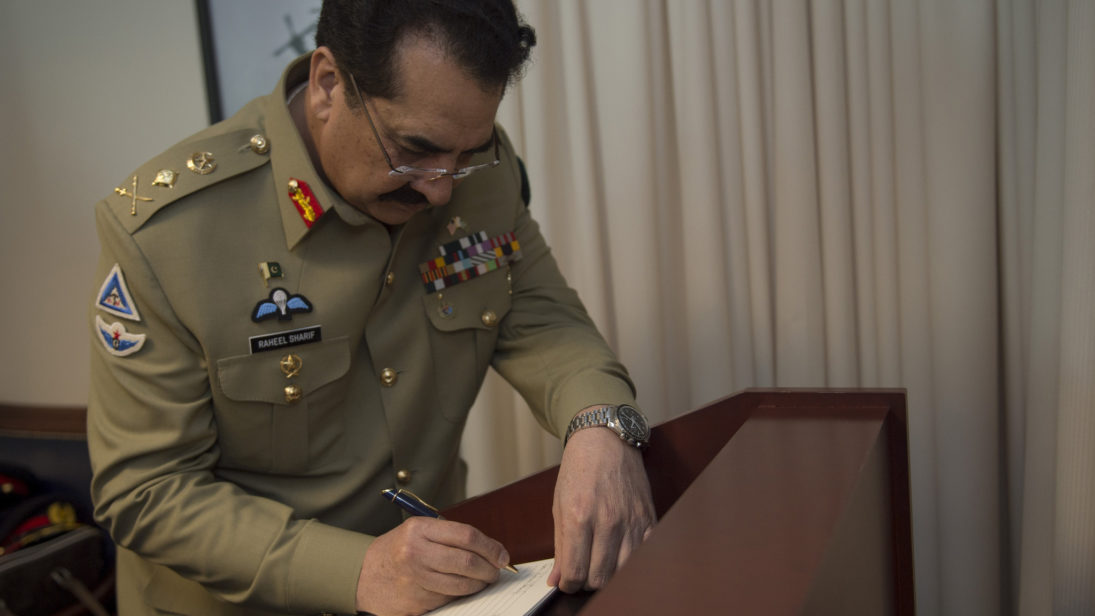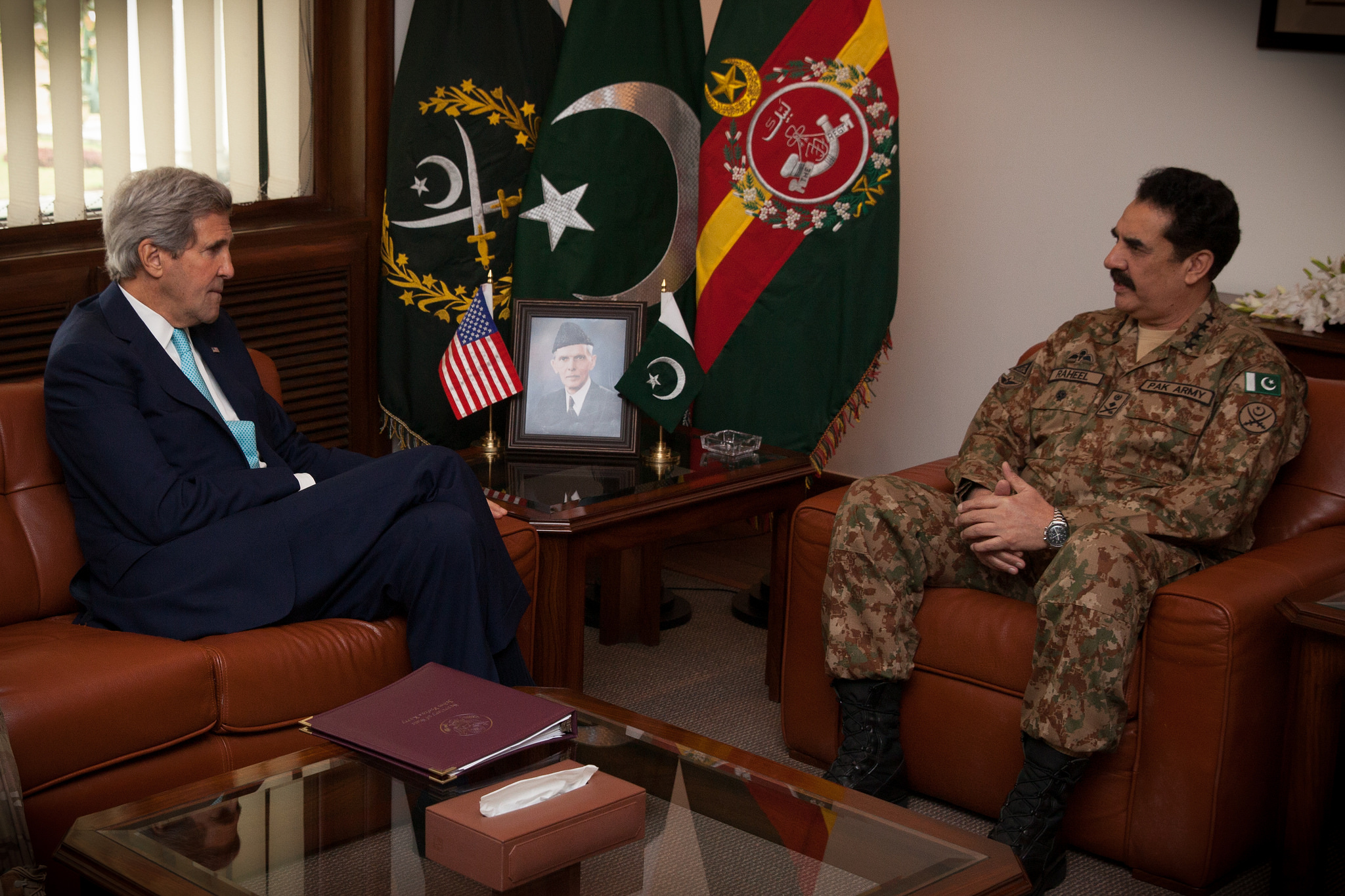
General Raheel Sharif’s impending retirement has become a trending topic not only in Pakistan but also in India. The media on both sides of the Line of Control are busy speculating whether or not General Sharif will retire in November. Some trends implying General Sharif would formally remain in a position of power include strong public support for an extension, worsening India-Pakistan relations, and positive American opinion of General Sharif, as exhibited by remarks from Senator John McCain. However, if the recent judgment of the Islamabad High Court is any indication, General Sharif will officially retire from his military duties next month.
There were expectations that Prime Minister Nawaz Sharif would offer General Sharif an extension or an honorary position as Field Marshal. One such claim had emerged from renowned journalist Rauf Klasra on his television show Muqabil. In August, a similar report by the Daily Times quoted senior journalist Arif Nizami as saying that there would be an announcement regarding General Sharif’s appointment as Field Marshal by September 6. However, according to the court ruling, the High Court cannot direct legislature to appoint General Sharif as Field Marshal because that would require creating a new law, since there is no such position in the constitution.
There is further evidence to suggest that General Sharif will formally retire in November. Senior journalist Ansar Abbasi’s January 2016 article in the News International claims that in a 2010 interview, not only did Prime Minister Sharif express his disdain for extensions in the military, but he also said that the government should not have offered an extension to General Ashfaq Pervez Kayani, General Sharif’s predecessor. His opposition to military extensions seems to be holding true in General Sharif’s case as well. Even more significant is General Sharif’s own statement asserting that he will retire as scheduled. In fact, he has firmly maintained this position from the very beginning of his time as the Chief of Army Staff.
Why then is it so difficult to believe that General Sharif does not want an extension? The issue would not have surfaced at all had it not been for extensions in the tenures of General Sharif’s predecessors, General Pervez Musharraf and General Ashfaq Pervez Kayani. In October 2001, General Musharraf received an “indefinite extension” to serve as the Chief of Army Staff. His downhill journey began soon thereafter. By 2007, he had established himself as president while holding on to his position as Chief of Army Staff, despite having promised earlier to relinquish his military post. For his part, General Kayani purportedly did not want an extension throughout his first tenure and sought one only towards the end of his initial three years. It was, in fact, during his second tenure that problems began to surface. For example, in a 2014 interview to the BBC, Maj Gen (retd) Athar Abbas, the former director general of ISPR, blamed General Kayani for his hesitation to launch a military operation in North Waziristan despite the army’s decision to do so years earlier.

Such instances reinforce the fact that an extension would only serve to weaken the military. This has certainly proven to be the case in the civil bureaucracy where an extension is a statutory provision that is supposed to be used sparingly under extraordinary circumstances. However, the propensity of successive political governments to give extensions beyond these circumstances has seriously compromised both the freedom and independence of the civil service. Furthermore, it has lead to the severe stagnation of advancement and widespread discouragement among junior officers. An extension for General Sharif would result in demoralizing not only the troops but also commanders who have all contributed significantly to the success of Operation Zarb-e-Azb. Among these commanders are the five main contenders for the post of Chief of Army Staff. Since extensions usually cause discord, if General Sharif were to accept one, he would inevitably be creating friction with the very people that he would ultimately have to work with.
This point is further served by the various positive effects General Sharif’s retirement announcement has had in Pakistan, among both members of the military and the political establishment. His announcement helped boost the morale of his ranks by emphasizing the importance of the Pakistan Army as an institution, and the ability of the organization and its ranks to carry the torch forward. His decision to retire was also met with widespread approval by the political elite, including Pakistan Tehreek-i-Insaf leader Imran Khan and Pakistani People’s Party leader (and former president) Asif Ali Zardari. Furthermore, it is important to consider that the retirement announcement did not lead to General Sharif becoming a “lame duck” as some predicted earlier. For example, following the recent militant attack in Quetta, General Sharif traveled to Quetta to personally monitor the situation, and later attended a high-level security meeting chaired by Prime Minister Sharif.
As the cases of General Musharraf and General Kayani show, even the strongest willed leaders in Pakistan have often succumbed to flattery, marring their ability to remain objective. Both sycophants and the misguided public alike are once again busy in trying to portray the country’s national interest in terms of General Sharif receiving an extension for another term as Chief of Army Staff. This seems misguided because the only thing that could ruin General Sharif’s popularity and permanently damage his image in the mind of the public in the long term would be to accept a second term as the Chief of Army Staff. General Sharif is known for being a dedicated professional and a revered commander. One hopes that he will keep his promise, and allow a successor to continue the gains made during his time in office, including with Operation Zarb-e-Azb.
***
Editor’s Note: Click here to read this article in Urdu
Image 1: OSD Deputy Secretary of Defense, Flickr
Image 2: U.S. Embassy Pakistan, Flickr


